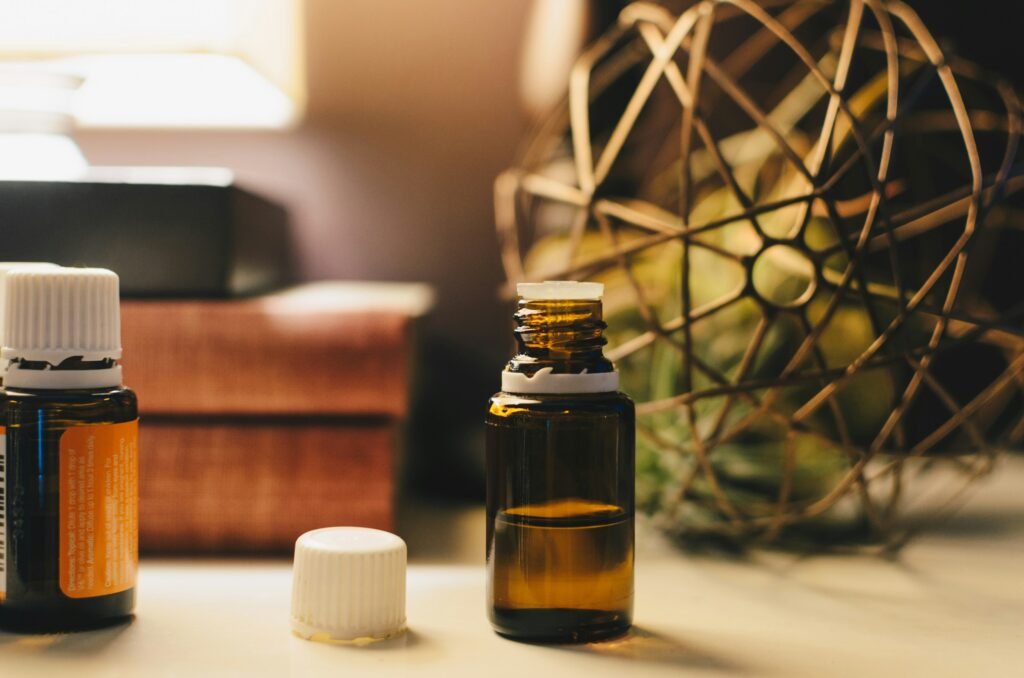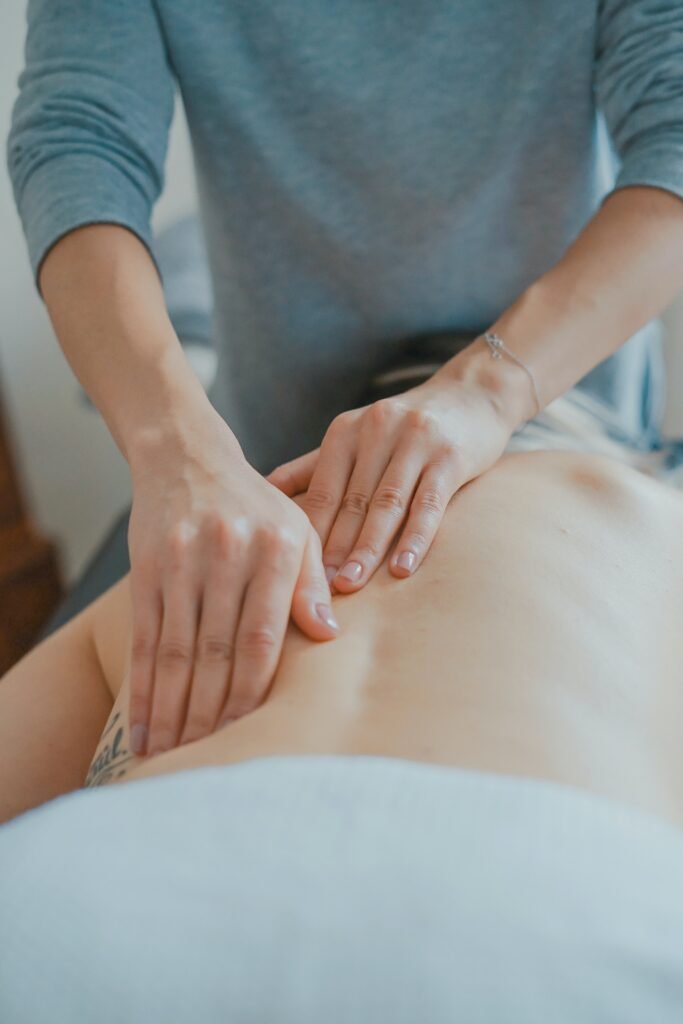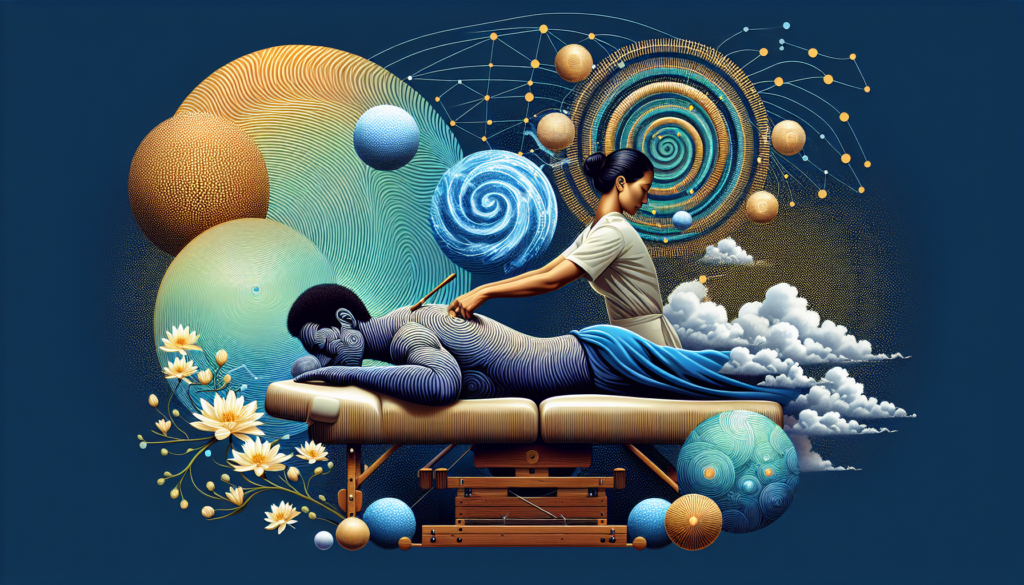Imagine a world where relaxation and healing go hand in hand. Where the gentle touch of skilled hands can relieve not only physical tension but also promote emotional well-being. This is the realm of massage therapy, a vital component of holistic health practices. By merging ancient wisdom with modern science, massage therapy offers a unique approach to healthcare that addresses the mind, body, and spirit. Whether you seek relief from muscular pain or simply want to improve your overall well-being, delving into the world of massage therapy can lead to a profound transformation in your holistic health journey. Massage therapy plays a vital role in holistic health practices as it offers a wide range of physical, mental, emotional, and energetic benefits. Through the skillful manipulation of muscles and soft tissues, massage therapy promotes healing and balance throughout the body. In this article, we will explore the various benefits of massage therapy and how it can be integrated with other holistic practices to enhance overall well-being.

Physical Benefits of Massage Therapy
Relief from muscle tension and pain
One of the primary physical benefits of massage therapy is its ability to provide relief from muscle tension and pain. Whether you’re dealing with tight muscles from a strenuous workout or chronic pain from an injury, massage therapy can help alleviate discomfort and promote relaxation. Skilled therapists use various techniques like kneading, compression, and stretching to target specific areas of tension, releasing built-up stress and improving muscle flexibility.
Improved blood circulation
Massage therapy also stimulates blood circulation, which is essential for delivering nutrients and oxygen to the body’s tissues. By increasing blood flow, massage helps remove metabolic waste and toxins from the muscles, promoting faster recovery and reducing the risk of injury. Improved blood circulation also aids in the healing process by providing the necessary nutrients to injured or damaged areas.
Boosted immune system
Regular massage sessions can boost the immune system by stimulating the production of white blood cells, which are crucial for fighting off infections and diseases. Massage therapy has been shown to increase the activity of the body’s natural killer cells, enhancing the body’s defense mechanism against harmful pathogens.
Reduced inflammation
Inflammation is a common response to injury or chronic conditions, which can cause pain and limit mobility. Massage therapy has been found to reduce inflammation by decreasing pro-inflammatory cytokines and increasing anti-inflammatory cytokines. By reducing inflammation, massage therapy can help alleviate pain, swelling, and stiffness, allowing for improved range of motion and faster recovery from injuries.
Improved range of motion and flexibility
Massage therapy can also help improve range of motion and flexibility by increasing the elasticity of muscles and connective tissues. Through techniques like stretching and joint mobilization, massage therapy helps loosen tight muscles and improve joint function. This increased range of motion can be beneficial for athletes, individuals recovering from injuries, or those looking to enhance their overall physical performance.
Mental and Emotional Benefits of Massage Therapy
Reduced stress and anxiety
In our fast-paced society, stress and anxiety have become prevalent issues that can negatively impact our overall well-being. Massage therapy provides a natural and effective way to reduce stress and anxiety by promoting relaxation and triggering the release of feel-good hormones like serotonin and dopamine. The soothing and comforting touch of a skilled massage therapist can help lower cortisol levels, the stress hormone, and induce a sense of calm and relaxation.
Enhanced relaxation and sleep quality
Massage therapy is renowned for its ability to induce deep relaxation and improve sleep quality. The combination of nurturing touch, dimmed lighting, and soothing music creates a tranquil atmosphere that promotes a state of relaxation. Regular massage sessions can help regulate sleep patterns by reducing insomnia and promoting deeper, more restful sleep.
Improved mood and emotional well-being
Massage therapy has a profound effect on our mood and emotional well-being. Through the release of endorphins, the body’s natural painkillers, massage therapy can elevate mood and create a sense of euphoria. It can also help reduce feelings of anger, sadness, and frustration, promoting a more positive outlook on life. The nurturing and non-judgmental environment of a massage session provides emotional support and can be a comforting experience for individuals dealing with emotional challenges.
Increased mental clarity and focus
Massage therapy has been found to improve mental clarity and focus by reducing mental fatigue and enhancing cognitive function. The deep relaxation induced by massage helps calm the mind and increase awareness, making it easier to concentrate and stay focused. This can be particularly beneficial for individuals with high-stress jobs or those needing to perform at their best mentally.
Alleviation of symptoms of depression
Massage therapy can also be beneficial for individuals suffering from depression. Research has shown that massage can reduce symptoms of depression by increasing serotonin and dopamine levels, two neurotransmitters responsible for regulating mood and emotions. The human touch and connection provided during a massage session can also help combat feelings of loneliness and isolation, providing a sense of comfort and support.
Energetic Benefits of Massage Therapy
Balancing and harmonizing energy flow
In addition to the physical and mental benefits, massage therapy also focuses on the energetic aspects of the body. According to many holistic practices, the body has an energetic system consisting of channels or pathways through which energy flows. Massage therapy helps balance and harmonize the energy flow within the body, promoting a sense of overall well-being and vitality.
Clearing blockages in the energy pathways
Sometimes, the energy pathways in our body can become blocked or congested, leading to physical or emotional imbalances. Massage therapy can help clear these blockages, allowing energy to flow freely and restoring harmony. Skilled massage therapists may use techniques like acupressure or reflexology to target specific points along the energy pathways, helping to alleviate blockages and promote a smooth energy flow.
Stimulating the body’s natural healing abilities
The human body has remarkable innate healing abilities, and massage therapy can stimulate these healing processes. By enhancing blood circulation, reducing inflammation, and promoting relaxation, massage therapy supports the body’s natural healing mechanisms. This can be particularly beneficial for individuals recovering from injuries, surgeries, or chronic health conditions.
Enhancing vitality and overall energy levels
When our energy is out of balance or depleted, we may experience fatigue, lethargy, or a lack of motivation. Massage therapy can help replenish and enhance our energy levels by clearing blockages, balancing energy flow, and promoting a sense of relaxation. Regular massage sessions can provide a natural energy boost, leaving you feeling refreshed and revitalized.
Promoting a sense of overall well-being
Massage therapy has a holistic approach to well-being, addressing not only the physical but also the mental, emotional, and energetic aspects of health. By promoting relaxation, reducing stress, and balancing energy flow, massage therapy creates an environment where the body can naturally heal and restore itself. This overall sense of well-being can positively impact all areas of life, leading to increased happiness and fulfillment.
Massage Therapy Techniques for Holistic Health
Massage therapy encompasses various techniques and approaches, each offering unique benefits. Depending on your needs and preferences, you can choose from a range of massage modalities to support your holistic health journey. Some popular massage therapy techniques include:
Swedish massage
Swedish massage is one of the most common massage techniques, characterized by long, flowing strokes, kneading, and gentle manipulation of muscles. It promotes relaxation, improves circulation, and helps relieve muscle tension and pain.
Deep tissue massage
Deep tissue massage focuses on releasing deep muscle knots and chronic tension. It uses firm pressure and slow strokes to target the deeper layers of muscles and connective tissues, providing relief from chronic pain and improving mobility.
Hot stone massage
Hot stone massage involves the use of heated stones placed on specific areas of the body. The heat from the stones helps relax muscles, promotes blood circulation, and enhances the overall massage experience. It is particularly beneficial for individuals with muscle tension or chronic pain.
Aromatherapy massage
Aromatherapy massage combines the benefits of massage therapy with the use of essential oils. The therapist may use oils known for their calming, invigorating, or pain-relieving properties, enhancing the therapeutic effects of the massage.
Thai massage
Thai massage is a unique and interactive form of massage therapy that combines acupressure, assisted yoga stretches, and deep compressions. It helps improve flexibility, balance energy flow, and promote deep relaxation.
When considering which massage technique to choose, it’s important to communicate your specific needs and preferences with a qualified massage therapist. They can guide you in selecting the most suitable technique based on your goals and desired outcomes.

Integrating Massage Therapy with Other Holistic Practices
Massage therapy can be seamlessly integrated with other holistic practices to enhance your overall well-being. Here are some practices that complement and enhance the benefits of massage therapy:
Yoga and Pilates
Yoga and Pilates are excellent practices to complement massage therapy. They promote flexibility, strength, and body awareness, which can optimize the benefits of massage. Engaging in regular yoga or Pilates sessions can help maintain and enhance the results achieved through massage therapy.
Acupuncture and acupressure
Acupuncture and acupressure are both ancient practices that work with the body’s energy system. These modalities can be performed before or after a massage session to enhance the energetic benefits and release any blockages or imbalances within the body.
Meditation and mindfulness
Meditation and mindfulness practices can deepen the relaxation and mental clarity gained from massage therapy. By focusing the mind and calming the thoughts, these practices can help you fully experience the benefits of massage and cultivate a sense of inner peace and well-being.
Herbal medicine and aromatherapy
Incorporating herbal medicine and aromatherapy into your holistic health routine can further enhance the healing effects of massage therapy. Using herbal remedies or essential oils known for their therapeutic properties can support the body’s natural healing processes and promote overall wellness.
Nutrition and dietary approaches
Maintaining a balanced and healthy diet is essential for holistic health. Proper nutrition provides the body with the necessary nutrients, vitamins, and minerals needed for optimal healing and well-being. Integrating massage therapy with a nutritious diet can amplify the physical and energetic benefits of both practices.
Finding a Qualified Massage Therapist
When seeking the benefits of massage therapy, it’s crucial to find a qualified and skilled massage therapist. Here are some tips to help you find the right therapist for your needs:
Checking for proper licensure and certifications
Ensure that the massage therapist you choose is licensed and certified to practice in your area. This ensures that they have met the necessary training and educational requirements to provide safe and effective massage therapy.
Researching therapist’s experience and reputation
Research the therapist’s experience and reputation before booking a session. Look for reviews, testimonials, or ask for recommendations from friends, family, or healthcare professionals.
Seeking recommendations from trusted sources
Personal recommendations are often reliable sources for finding a qualified massage therapist. Ask for recommendations from friends, family, or healthcare providers who have had positive experiences with massage therapy.
Inquiring about specific massage techniques offered
Different massage therapists may specialize in different techniques or modalities. Inquire about the specific massage techniques offered and determine whether they align with your needs and preferences.
Discussing individual needs and goals with the therapist
During your initial consultation or before the session, provide the massage therapist with information about your specific needs, concerns, and goals. Clear communication ensures that the therapist can tailor the session to address your specific needs and provide the most beneficial experience.

Preparing for a Massage Therapy Session
To make the most of your massage therapy session, it’s helpful to prepare beforehand. Here are some tips for preparing:
Schedule the session at a convenient time
Choose a time that allows you to fully relax and enjoy the benefits of the massage. Avoid scheduling the session during a time when you have other commitments or immediately before or after a stressful event.
Communicate any specific concerns or preferences
Inform the massage therapist of any specific concerns, preferences, or areas of the body that you would like them to focus on. Clear communication ensures that the therapist can tailor the session to meet your individual needs.
Arrive early to have time for relaxation
Arriving a few minutes early allows you time to settle in and relax before the massage. Rushing to the appointment can create unnecessary stress and hinder your ability to fully unwind.
Hydrate adequately before and after the massage
Drink plenty of water before and after your massage therapy session to help flush out toxins and support the body’s natural healing processes. Hydration is crucial for optimal well-being.
Wear comfortable clothing
Wear loose-fitting, comfortable clothing to your massage therapy session. This ensures that you can easily disrobe, if necessary, and allows for a more relaxed and comfortable experience.
What to Expect During a Massage Therapy Session
During a massage therapy session, you can expect the following:
Initial consultation and assessment
Before the session, the massage therapist will conduct an initial consultation and assessment to gather information about your health history, goals, and any concerns or areas of focus. This information helps the therapist create a personalized treatment plan.
Dimmed lighting and soothing music
Massage therapy sessions are typically conducted in a tranquil and soothing environment. The lighting is usually dimmed, and soft, relaxing music may be played to create a peaceful atmosphere.
Use of massage oils or lotions
To reduce friction on the skin and enable smooth and flowing movements, the massage therapist may use massage oils or lotions. These products are usually hypoallergenic and designed to nourish and hydrate the skin.
Various massage techniques and pressure applied
During the massage, the therapist will use a combination of techniques and pressure that best suit your needs. They may incorporate techniques such as kneading, stroking, stretching, or deep pressure, depending on your individual requirements.
Feedback and communication with the therapist
During the session, you are encouraged to provide feedback to the therapist regarding pressure, comfort, or any specific sensations you may experience. Clear communication ensures that the therapist can adjust their techniques to ensure your comfort and satisfaction.

Post-Massage Care and Lifestyle Recommendations
To maximize the benefits of your massage therapy session, it’s important to practice post-massage care and incorporate healthy lifestyle habits. Here are some recommendations:
Allow time for rest and relaxation
After a massage therapy session, take time to rest and relax. Your body needs time to integrate and respond to the therapeutic effects of the massage. Avoid rushing into intense physical activity or stressful situations immediately after the session.
Drink plenty of water to flush out toxins
Hydration is essential after a massage therapy session to help flush out toxins released during the massage. Drink plenty of water to support the body’s natural detoxification processes and rehydrate the tissues.
Avoid intense physical activity or exertion
While gentle movement and stretching can be beneficial, avoid intense physical activity or exertion immediately after a massage. Your body needs time to recover and restore balance, so it’s best to allow for a period of rest before engaging in vigorous exercise.
Incorporate self-care practices at home
To extend the benefits of massage therapy, incorporate self-care practices at home. This can include gentle stretching, self-massage, warm baths, or relaxation techniques like deep breathing or meditation.
Maintain a balanced and healthy lifestyle
Massage therapy is most effective when combined with a balanced and healthy lifestyle. Make sure to prioritize adequate sleep, maintain a nutritious diet, engage in regular exercise, and manage stress levels. These lifestyle choices can enhance the therapeutic effects of massage therapy and support overall well-being.
Possible Side Effects and Considerations
While massage therapy is generally safe and beneficial, there are a few considerations and possible side effects to keep in mind:
Soreness or mild discomfort after the massage
It is common to experience some soreness or mild discomfort after a massage, especially if deeper pressure or intense techniques were used. This discomfort usually subsides within 24-48 hours and is a normal response to the manipulation of muscles.
Increased urination and frequent bowel movements
Massage therapy can stimulate the body’s systems, including the urinary and digestive systems. This may lead to increased urination and frequent bowel movements in some individuals. These effects are temporary and typically subside after a day or two.
Potential allergic reactions to massage oils or lotions
If you have allergies or sensitivities to certain ingredients, discuss this with your massage therapist. They can select appropriate oils or lotions that are hypoallergenic and compatible with your individual needs.
Caution in certain medical conditions or pregnancy
If you have any underlying medical conditions or are pregnant, it is important to consult with your healthcare provider before receiving massage therapy. They can advise on any precautions or modifications that may be necessary to ensure your safety and well-being.
Communication with the therapist about any concerns or sensitivities
Throughout the massage therapy session, communicate any concerns, sensitivities, or discomfort to the therapist. Clear communication allows them to tailor the session to your needs and ensure a safe and enjoyable experience.
In conclusion, massage therapy plays a multifaceted role in holistic health practices. Whether you seek relief from physical pain, stress reduction, or a boost in overall well-being, massage therapy offers a wide array of benefits. By integrating massage therapy with other holistic practices and maintaining a balanced lifestyle, you can optimize its therapeutic effects and enhance your journey towards holistic wellness. Remember to find a qualified massage therapist, communicate your needs, and embrace the healing power of touch and intention.



